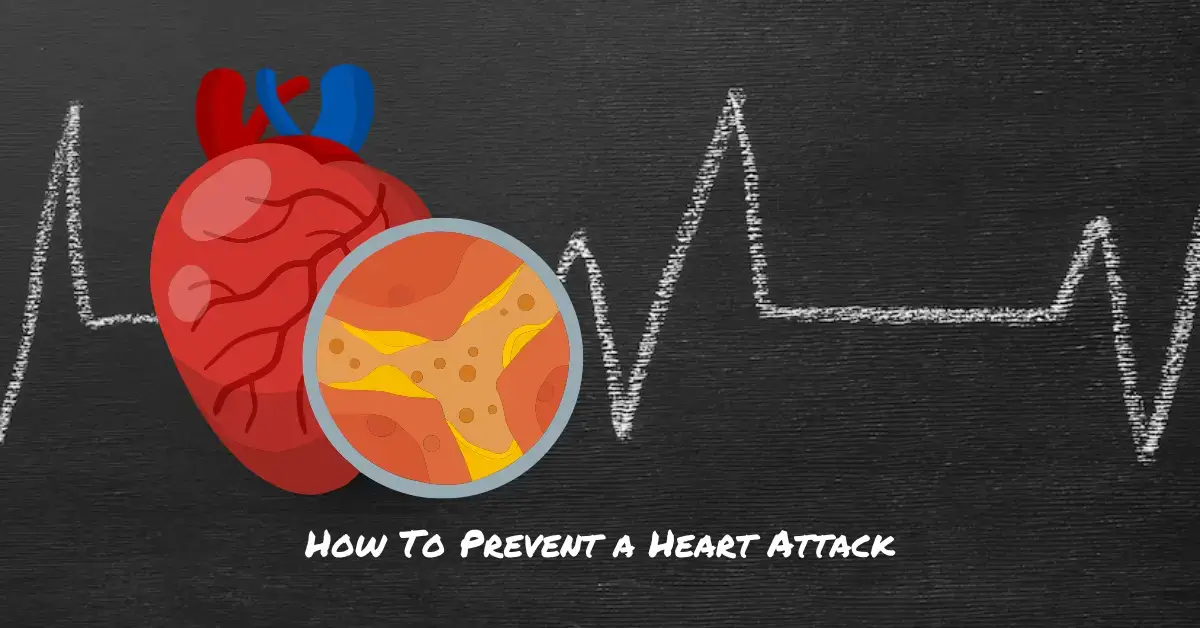Learn how to prevent heart attacks with expert tips on lifestyle changes, managing risk factors, and recognizing symptoms. Discover proactive measures to safeguard your heart health and reduce the risk of cardiovascular events.
Contents
How to Prevent a Heart Attack
Taking care of your heart is essential for your overall health and well-being. Heart attacks continue to be one of the leading causes of mortality globally, and it is crucial to be aware of preventive measures to reduce the risk of heart attacks. A few preventive strategies are a heart-healthy diet, frequent exercise, keeping a healthy weight, giving up smoking, setting high blood pressure, and lowering cholesterol.
A heart-healthy diet includes many fruits, vegetables, whole grains, lean proteins, and healthy fats. Exercises such as walking, swimming, or cycling can help maintain a healthy weight and improve heart health. Furthermore, cutting back on smoking and managing high blood pressure and cholesterol can greatly lower the risk of heart attacks.
You may lower your risk of heart attacks and enhance your general health and well-being by taking a proactive approach to heart health and implementing these preventive actions into your everyday routine.
Understanding Heart Attacks
Heart attacks, often referred to as myocardial infarctions, happen when there is an abrupt obstruction of the circulation of the heart muscle, typically due to a blood clot. Because of this obstruction, the heart muscle is deprived of vital nutrients and oxygen, which can lead to tissue damage or even death. Fatty plaque accumulation in the arteries supplying blood to the heart muscle is the most frequent cause of a heart attack. These plaques have the potential to burst, forming a blood clot that may obstruct the artery and cause a heart attack. Shortness of breath, nausea, vomiting, dizziness, and chest pain or discomfort are some of the signs and symptoms of a heart attack. If you think you or someone you know is having a heart attack, you should get medical aid right away since timely care can reduce heart muscle damage and increase survival rates.
Signs and Symptoms
For timely intervention, it is imperative to be well-informed about the various signs and symptoms of a heart attack, as this could potentially save a life. Some of the common indications of a heart attack include discomfort or chest pain, which may be experienced as heavy pressure, squeezing, or tightness in the chest that may persist for several minutes or come and go. Additionally, one may experience shortness of breath, nausea, or indigestion, along with neck, jaw, or back pain, which may feel like a burning sensation or aching. Don’t ignore the possibility of weakness or fainting. It’s important to be aware that, in some cases, these symptoms may also be observed. It is important to note that not everyone may experience all these symptoms, and some may not even have chest pain. In case of any doubt, it is always better to seek medical help immediately.
Preventive Measures
Preventing heart attacks is a complex and multifaceted process requiring a detailed understanding of the risk factors involved. Adopting a healthy lifestyle is one of the most important steps in preventing heart disease. It’s imperative to have a balanced diet rich in whole grains, lean meats, and various fruits and vegetables. Consuming less salt, added sweets, saturated fats, and trans fats is also crucial.
Regular exercise is another crucial component of heart attack prevention. An active lifestyle can reduce blood pressure, prevent heart disease, and lower cholesterol by exercising 30 minutes or more five times a week. Exercise also reduces the risk of heart attacks as a result of stress management.
Deep breathing exercises, yoga, and meditation are effective stress-reduction methods that can lower the risk of heart disease. These exercises assist in lowering blood pressure, controlling heart rate, and lowering the release of stress chemicals like cortisol.
One of the most crucial things you can do to avoid heart attacks is to stop smoking. Heart disease, heart attacks, strokes, and other cardiovascular issues are made more likely by smoking.
Finally, moderating alcohol intake is also critical in preventing heart disease. Despite moderate alcohol consumption having some health benefits, excessive drinking can increase blood pressure, cause weight gain, and worsen other health conditions.
In conclusion, the best way to prevent heart attacks is to lead a healthy lifestyle that includes a balanced diet, frequent exercise, efficient stress-reduction methods, abstaining from smoking, and moderation in alcohol use.
Managing Risk Factors
Managing underlying health risk factors is crucial to preventing serious health issues. Health hazards can arise from several conditions, including high blood pressure, raised cholesterol, diabetes, obesity, and sedentary lifestyles. Making these lifestyle adjustments can lower your chance of contracting life-threatening illnesses, including diabetes, heart disease, and stroke.
Sometimes, healthcare providers prescribe statins or blood pressure medications to help manage these risk factors. These medications work by reducing cholesterol levels or lowering blood pressure, which can help prevent serious health issues. However, it’s important to note that medication alone may not be enough to manage these risk factors effectively. Achieving the best possible health results may include medication and lifestyle modifications.
Role of Medication
Taking medication can be a very effective way to prevent heart attacks. Statins are a type of drug that works by lowering the levels of cholesterol in your body. Five days a week of physical activity can help reduce blood pressure, heart disease, and cholesterol risk. Statins can help prevent this buildup and lower your risk of a heart attack by reducing cholesterol levels.
Blood pressure medications can also be very helpful in preventing heart attacks. High blood pressure, also known as hypertension, can put a lot of strain on your heart and your blood vessels. Over time, this can cause damage that can increase your risk of heart disease and heart attacks. By taking medication to manage your blood pressure, you can reduce this strain and help prevent these problems from occurring.
Aspirin is another medication that a doctor can prescribe to help prevent heart attacks. Aspirin works by reducing your blood’s ability to form clots. Because blood clots can stop your heart’s blood supply and cause a heart attack, they can be quite harmful. Aspirin can lessen the risk of blood clots and heart attacks. However, it’s important to note that aspirin is not suitable for everyone and should only be taken under the guidance of a doctor.
Emergency Response
It is vital to recognize the symptoms of a heart attack and take immediate action. A heart attack occurs when blood circulation to the heart muscle is stopped. It may result in the heart muscle being harmed or dying. Quick action is necessary in a medical situation to reduce the harm and improve the patient’s life chances.
While each person will experience heart attack symptoms differently, the most typical one is chest pain or discomfort, which might feel like pressure, fullness, squeezing, or pain. Additional symptoms could be lightheadedness, nausea, dyspnea, or pain in the arms, neck, jaw, or back, among other upper body parts.
If you or anybody else exhibits heart attack-like symptoms, contact emergency services right away. Be sure to call for help, even if you are not sure if it is a heart attack. Time is of the essence, and quick action can make a significant difference in the outcome.
Suppose you know how to use CPR until help arrives. Until medical professionals take over, CPR can help keep the heart and brain supplied with blood and oxygen. Remember, every second counts in a heart attack, and your quick thinking and action can save a life.
Support and Rehabilitation
Heart attacks are a dangerous medical emergency and need to be treated right away. Nonetheless, it’s critical to remember that healing depends on recovery. Engaging in a cardiac rehabilitation program helps expedite healing and lower the likelihood of experiencing another cardiac event.
Exercise, heart health education, and emotional support are all possible components of cardiac rehabilitation programs, providing a holistic healing approach. Apart from its physiological advantages, physical activity also aids in lowering stress and anxiety levels, which are prevalent psychological issues after a heart attack.
Furthermore, emotional support and counseling can play a significant role in addressing psychological concerns. Recognizing that a heart attack can have an equally major emotional impact as well as physical effects is crucial. By seeking emotional support and counseling, patients can learn how to cope with the emotional toll of the experience, which can help them manage their recovery better.
Finally, lifestyle modifications are essential to promote heart health after a heart attack. Maintaining a good diet, working out frequently, and controlling stress can lower the chance of another cardiac attack. Making these lifestyle changes can seem overwhelming, but participating in a cardiac rehabilitation program can give patients the tools and resources they need to make these changes successfully.
In summary, cardiac rehabilitation programs are an effective way to aid recovery and reduce the risk of future cardiac events. By participating in these programs, patients can receive the physical, emotional, and psychological support they need to manage their recovery and promote heart health successfully.
Promoting Heart Health Awareness
Community education programs are essential in promoting heart health and preventing heart attacks. These programs are vital in raising public awareness about the importance of regular screenings, debunking heart health myths, and promoting healthy lifestyle choices.
Regular screenings are an integral part of preventing heart attacks. Community education programs encourage individuals to get screened regularly, which can help identify potential heart problems early on. Early detection allows for prompt medical intervention, significantly improving the chances of recovery.
Community education programs also aim to debunk common myths surrounding heart health. These misconceptions may be dangerous because they keep people from taking the appropriate precautions to avoid heart attacks. Community education programs help individuals make informed decisions about their heart health by providing accurate information and dispelling misconceptions.
In addition to promoting regular screenings and debunking myths, community education programs also promote healthy lifestyle choices. These programs give participants the skills and information they need to make healthy lifestyle choices, like eating a balanced diet, working out frequently, and giving up smoking. Individuals can significantly reduce their risk of heart attacks by making these lifestyle changes.
Community education programs are crucial in promoting heart health and preventing heart attacks. These programs play a vital role in keeping communities healthy and safe by encouraging regular screenings, debunking myths, and promoting healthy lifestyle choices.
Conclusion
Understanding the risk factors and taking a proactive approach to heart health are the first steps in preventing a heart attack. People can drastically lower their chance of having a heart attack by adopting educated lifestyle decisions, taking care of any underlying medical disorders, and getting prompt medical attention.
FAQs on reducing Heart Attack
Q. What are the four signs of an impending heart attack?
The four common signs of an impending heart attack include chest pain or discomfort, shortness of breath, nausea, and pain or discomfort in the neck, jaw, or back.
Q. How do I avoid a heart attack?
To help prevent a heart attack, living a healthy lifestyle is important. Maintain a balanced diet, exercise regularly, manage stress, quit smoking, drink alcohol in moderation, and take care of any health conditions such as high blood pressure, high cholesterol, or diabetes. By taking these steps, you can reduce your risk of a heart attack and improve your overall health.
Q. How do you stop a heart attack in progress?
If you suspect you or someone else is having a heart attack, it’s crucial to seek emergency medical help immediately by calling emergency services. While waiting for help to arrive, administering aspirin if available and performing CPR if trained can help improve the chances of survival.
Q. What is 1 rule for surviving a heart attack?
One rule for surviving a heart attack is to act quickly. Recognizing the symptoms and seeking prompt medical attention can significantly improve the outcome of a heart attack.
Q. Can drinking water prevent heart attacks?
While staying hydrated is important for overall health, drinking water alone cannot prevent heart attacks. However, maintaining proper hydration is a part of a healthy lifestyle, contributing to overall heart health.
Q. Should you sit up or lie down during a heart attack?
It is advisable to sit upright instead of lying down during a heart attack, as it can reduce heart pressure and increase blood flow. However, the most important action is to seek emergency medical assistance immediately.
Read more articles on Health and Wellness.
You might like to read:
Healthcare at Home: The Telemedicine Home Care Kit Revolution
Health Risks Associated with Tattoos and How to Mitigate Them










